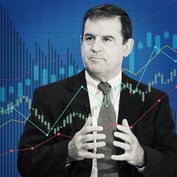The flap about withdrawal rates continues, so I ran another example of why Bill Bengen’s 4 percent thesis is still valid. In this one I used one stock, Berkshire Hathaway B (BRK.B).
The one-stock idea seemed to give Morningstar Advisor Workstation indigestion, since it showed the performance in the high-risk, low-return quadrant, even though it showed a 10-year beta of 0.53, all of which was confusing. Given the latest run-up in the S&P, Berkshire trailed very slightly, but for most of the time, Berkshire was ahead of the index, which amplifies the sequence-of-returns story.
This 12.25-year period ending March 31, 2013 encompassed the worst decade in Berkshire history, a decade that lowered its average return since 1965 to just over 19 percent yearly.
So, same deal as last week — had you invested $1 million in Berkshire B on Jan. 1, 2000, and withdrawn 4.2 percent the first year, adding 3 percent annually to the 4.2 percent to handle any inflationary concerns, you would have received $842,313 over the 12.25 years, and how much would be left?
The answer: $1,452,000!
If you give the portfolio a bit of thought, your customer should be fine with a 4.2 percent withdrawal rate.
I subtracted a 1.12 percent fee to arrive at the above numbers, which would more than cover any monthly sales trading expenses. I ignored taxes. Only government regulators would deduct taxes in an illustration — a bit of CYA, since most of us long ago figured out that any income we receive is taxed. If the shares were in a brokerage account and the broker charged a monthly commission on monthly share redemptions, the result would likely be even better. And the taxes would range from short-term capital gains to long-term to none (during any capital loss periods).








 April 25, 2013 at 12:51 AM
April 25, 2013 at 12:51 AM










